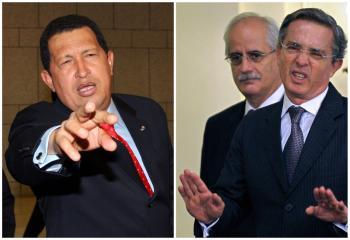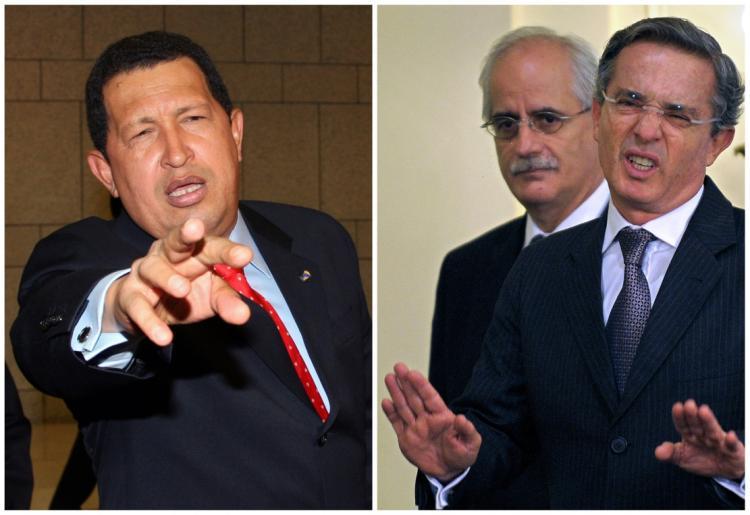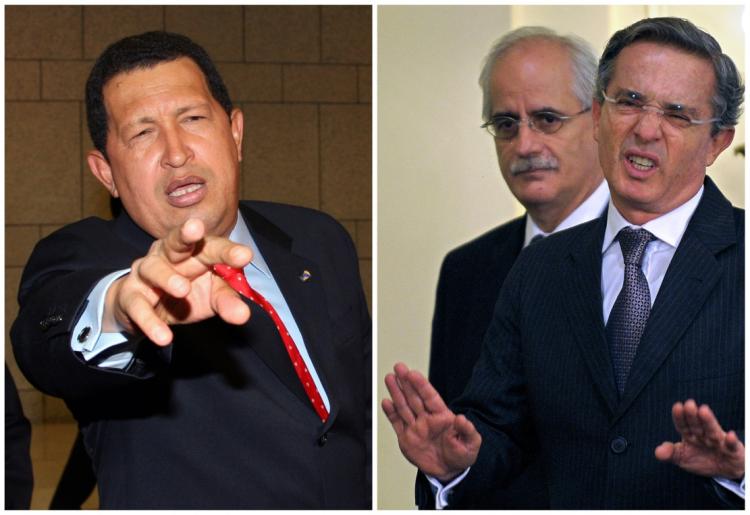The fracas between Venezuela and Colombia was turned up a notch on Thursday when Colombia announced the recall of its ambassador in Caracas. Several days earlier, Venezuela called home its ambassador from Bogota.
The dispute is over Colombia’s accusations that its neighbor to the east is harboring leftist Marxist guerrillas, including FARC (Revolutionary Armed Forces of Colombia) leaders Ivan Marquez and Rodrigo Granda.
Colombian President Alvaro Uribe says he has satellite photos, video, and intelligence from rebel deserters that proves several FARC commanders are living in Venezuela. Venezuela has denied the charges.
On Thursday, Washington hosted a special meeting of the Organization of American States (OAS), where Colombian Defense Minister Gabriel Silva and Foreign Minister Jaime Bermudez were to present the evidence.
Venezuelan President Hugo Chavez said his Colombian counterpart’s allegations were a last-ditch effort to sabotage relations with Venezuela for the incoming Colombian government.
Uribe leaves office in August and will be succeeded by his former defense minister Juan Manuel Santos, who is known as being soft on Caracas.
However, one day before the hearing was scheduled to start, the president of the permanent council of the OAS, Ecuadorean Francisco Proaño, resigned due to pressure from his home office to postpone the meeting in the name of “giving dialogue a chance.” Ecuador and Venezuela are close allies. Proaño will be succeeded by El Salvadorian Joaquin Maza.
Earlier this week, farmers from the province of Norte de Santander in northeast Colombia claimed that Venezuelan soldiers had crossed the border into Colombia and fired shots into the air, according to reports.
After the dissolution of diplomatic relations between Venezuela and Colombia in 2009, incidents such as these have become a common phenomenon.
The diplomatic chill was triggered when Colombia signed a deal with the White House allowing the U.S. military access to several Colombian army bases, which was viewed by Chavez as a threat to regional sovereignty.
The dispute is over Colombia’s accusations that its neighbor to the east is harboring leftist Marxist guerrillas, including FARC (Revolutionary Armed Forces of Colombia) leaders Ivan Marquez and Rodrigo Granda.
Colombian President Alvaro Uribe says he has satellite photos, video, and intelligence from rebel deserters that proves several FARC commanders are living in Venezuela. Venezuela has denied the charges.
On Thursday, Washington hosted a special meeting of the Organization of American States (OAS), where Colombian Defense Minister Gabriel Silva and Foreign Minister Jaime Bermudez were to present the evidence.
Venezuelan President Hugo Chavez said his Colombian counterpart’s allegations were a last-ditch effort to sabotage relations with Venezuela for the incoming Colombian government.
Uribe leaves office in August and will be succeeded by his former defense minister Juan Manuel Santos, who is known as being soft on Caracas.
However, one day before the hearing was scheduled to start, the president of the permanent council of the OAS, Ecuadorean Francisco Proaño, resigned due to pressure from his home office to postpone the meeting in the name of “giving dialogue a chance.” Ecuador and Venezuela are close allies. Proaño will be succeeded by El Salvadorian Joaquin Maza.
Earlier this week, farmers from the province of Norte de Santander in northeast Colombia claimed that Venezuelan soldiers had crossed the border into Colombia and fired shots into the air, according to reports.
After the dissolution of diplomatic relations between Venezuela and Colombia in 2009, incidents such as these have become a common phenomenon.
The diplomatic chill was triggered when Colombia signed a deal with the White House allowing the U.S. military access to several Colombian army bases, which was viewed by Chavez as a threat to regional sovereignty.







